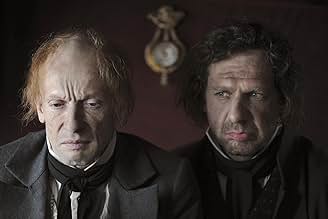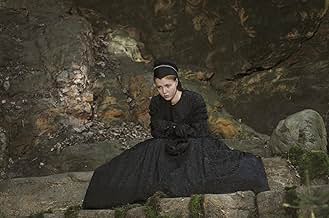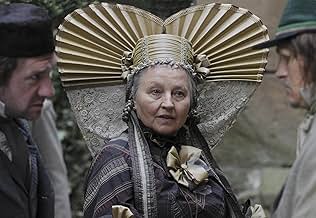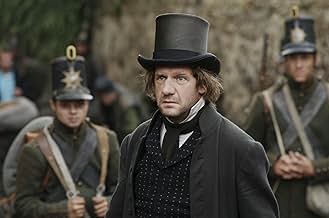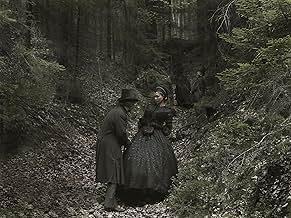IMDb-BEWERTUNG
6,5/10
5915
IHRE BEWERTUNG
Ein verzweifelter Gelehrter verkauft Satan seine Seele im Austausch für eine Nacht mit einer schönen jungen Frau.Ein verzweifelter Gelehrter verkauft Satan seine Seele im Austausch für eine Nacht mit einer schönen jungen Frau.Ein verzweifelter Gelehrter verkauft Satan seine Seele im Austausch für eine Nacht mit einer schönen jungen Frau.
- Auszeichnungen
- 15 Gewinne & 27 Nominierungen insgesamt
Eva-Maria Kurz
- Faust's Cook
- (as Eva Kurz)
Empfohlene Bewertungen
Faust has quite rightly fallen under everyone's radar. I had never heard of it, until I saw it in a list someone made. It looked interesting, and then I read that it made one of my all time favourite directors, Darren Aronofsky cry. He has also infamously stated that Faust is the kind of film that has the power to change your life, or something along those lines. I then watched the trailer and it looked intense, powerful and not too much unlike Darren's own operatic masterpiece, Black Swan, which happens to be possibly my favourite film of all time. Thus of course I was sold. I bought the film on blu ray for £6.26 and was extremely excited to give it a watch. I went into Faust very open-minded. More than open-minded because I was honestly looking forward to it, I was expecting a beautifully intense and dream-like film, but unfortunately that is not what I received.
The highest point in Faust is the brilliant opening shot which gracefully glides through the sky, where a mirror is bizarrely floating. We then pass underneath the clouds to reveal some awesome mountains and a village. It's a brilliant shot, reminiscent of Baz Luhrman's Moulin Rouge! We then get a nice close-up of a dead man's penis and some grisly depictions of an autopsy. It's here that the film slowly goes downhill, or rather curiously meanders down a dull path which should hopefully cure anyone of insomnia. A lot of reviewers seem concerned that the film is not a direct re-telling of the Faust legend. Unluckily for me, I have never read or seen anything to do with Goethe's Faust, which is a shame because it may have helped me to understand what was going on, as I was sometimes lost.
My first problem with the film is that it has been unnecessarily boxed up. By this I mean that the film has black bands either side of the screen, which makes it more difficult to appreciate one of it's biggest redeeming features, the visuals. I don't see the point in doing this, unless it's only on the UK blu ray version of the film, which by the way, is not blu ray quality! It's also very easy to get lost in the film, and not in a good David Lynch kind of way, but a tedious way. I watch a lot of subtitled films, because I have a passion for foreign cinema, but even I found it difficult to keep up with. Someone is always talking at quite a brisk pace, meaning that you've got to keep up with the subtitles, meaning that a lot of the visuals get lost. The dialogue is also quite boringly pretentious with talks about philosophy and the like.
However, if you strip back the story of the film there really isn't too much to it. It's just about a man who befriends an old man (who I think is supposed to be the devil) and he randomly falls for a young bereaved woman, and decides to sign his soul away in order to spend a night with her. But for some reason the film has been ludicrously padded out to 2 hours 20 minutes (it feels longer). Much of the film just follows Faust as he plods around with the devil, who rambles on for non-stop about things I don't entirely understand. It's the walking equivalent to a road movie, only nothing very interesting happens. I found much of it very boring, but I stuck with it.
Faust isn't all bad though. It's at its most interesting when it's using surrealism to a bizarre and sometime unsettling effect. There's a monkey on the moon, an old man with a body like Danny De Vito in Batman Returns and a small person in a jar made from the liver of a donkey. Unfortunately these moments are few and far between. The film is much more interesting in lecturing the audience through boring characters who don't really develop or interest in any way. The film is also very often fantastic to look at. I loved how the film looked like it had all the colours drained from it and the locations were rich with period detail. The costumes were also lavish. The production values are actually quite excellent for an unknown German film. Unfortunately the screenplay isn't.
Faust isn't the most boring film I've ever seen, but then again you're reading a review written by a poor chap who has sat through such cinematic stimulation as Import/Export and Uzak. Two of the most boring films on the planet. Faust doesn't come close to the level of boredom they caused, but if you've seen them then you'll know that that really isn't saying a lot. Faust is boring and has little plot or characters that capture your attention. It does have sporadic moments of creativity and surrealism, but there aren't enough of these moments to warrant it being watched. I think it's a film strictly for pseuds. Unfortunately I failed to find it intense, powerful or life changing. Ironically Faust is a film with no soul, or perhaps that's the point. I don't know. All I know is that I wasted £6.
The highest point in Faust is the brilliant opening shot which gracefully glides through the sky, where a mirror is bizarrely floating. We then pass underneath the clouds to reveal some awesome mountains and a village. It's a brilliant shot, reminiscent of Baz Luhrman's Moulin Rouge! We then get a nice close-up of a dead man's penis and some grisly depictions of an autopsy. It's here that the film slowly goes downhill, or rather curiously meanders down a dull path which should hopefully cure anyone of insomnia. A lot of reviewers seem concerned that the film is not a direct re-telling of the Faust legend. Unluckily for me, I have never read or seen anything to do with Goethe's Faust, which is a shame because it may have helped me to understand what was going on, as I was sometimes lost.
My first problem with the film is that it has been unnecessarily boxed up. By this I mean that the film has black bands either side of the screen, which makes it more difficult to appreciate one of it's biggest redeeming features, the visuals. I don't see the point in doing this, unless it's only on the UK blu ray version of the film, which by the way, is not blu ray quality! It's also very easy to get lost in the film, and not in a good David Lynch kind of way, but a tedious way. I watch a lot of subtitled films, because I have a passion for foreign cinema, but even I found it difficult to keep up with. Someone is always talking at quite a brisk pace, meaning that you've got to keep up with the subtitles, meaning that a lot of the visuals get lost. The dialogue is also quite boringly pretentious with talks about philosophy and the like.
However, if you strip back the story of the film there really isn't too much to it. It's just about a man who befriends an old man (who I think is supposed to be the devil) and he randomly falls for a young bereaved woman, and decides to sign his soul away in order to spend a night with her. But for some reason the film has been ludicrously padded out to 2 hours 20 minutes (it feels longer). Much of the film just follows Faust as he plods around with the devil, who rambles on for non-stop about things I don't entirely understand. It's the walking equivalent to a road movie, only nothing very interesting happens. I found much of it very boring, but I stuck with it.
Faust isn't all bad though. It's at its most interesting when it's using surrealism to a bizarre and sometime unsettling effect. There's a monkey on the moon, an old man with a body like Danny De Vito in Batman Returns and a small person in a jar made from the liver of a donkey. Unfortunately these moments are few and far between. The film is much more interesting in lecturing the audience through boring characters who don't really develop or interest in any way. The film is also very often fantastic to look at. I loved how the film looked like it had all the colours drained from it and the locations were rich with period detail. The costumes were also lavish. The production values are actually quite excellent for an unknown German film. Unfortunately the screenplay isn't.
Faust isn't the most boring film I've ever seen, but then again you're reading a review written by a poor chap who has sat through such cinematic stimulation as Import/Export and Uzak. Two of the most boring films on the planet. Faust doesn't come close to the level of boredom they caused, but if you've seen them then you'll know that that really isn't saying a lot. Faust is boring and has little plot or characters that capture your attention. It does have sporadic moments of creativity and surrealism, but there aren't enough of these moments to warrant it being watched. I think it's a film strictly for pseuds. Unfortunately I failed to find it intense, powerful or life changing. Ironically Faust is a film with no soul, or perhaps that's the point. I don't know. All I know is that I wasted £6.
"Wohin?" "Dahin"
The movie opens with the Herr Doktor cutting open a rotting corpse, declaring that he has looked for man's soul and has found that there is none.
The scene is a microcosm of the film's despairing vision of modern man's immorality, descended into seeing all as mere material. In this world, the old moral code remains only in debased form: good does not exist but evil does. The film's aesthetic is ruled by filth, and everyone's body seems either decaying or malformed (bodies are all they are).
And so too has Faust's famous bargain with the devil been seriously downgraded. Goethe's Faust was foolish but noble: he signed his soul away for knowledge, a mirage of human perfectibility. Sokurov's Faust signs his off without so much as a second thought - and for what? So little! A bit of money and a bit of ass. All here is only bestial (and fleeting) pleasure. There is no longer even a dream of something better. All are selfish, mean and disgusting, loving no one, not even themselves. The film is a nightmarish verdict on modern man: he has given up the better part of himself to live like an animal, and in the end does not even realize what he has done. We the viewer are left to wonder whether there ever was a 'better part' of us at all. However, the one character who seems to recognize the fallen state of things is Faust's father, perhaps an indication that the old generation could still see the devil for what he is. Hardly hopeful, but maybe a sign that modern man's crass materialism and selfishness is not the whole story.
Compared to an aesthetic depiction of something like The Portrait of Dorian Gray, by Oscar Wilde, also a story of corruption, this ugly, often grotestque film, loosely based on Goethe´s Faust, is disappointing. It was a slog to get through because it was so drab and disgusting. Dust and darkness everywhere. Gross, deformed characters. Filth, misery, poverty, disease. Rats. Altogether quite unpleasant to watch. Still, I have to say that the director succeeds in creating a film as depressing as its subject: the corruption of a human being and the selling of his soul.
a question more than a film. nothing surprising for Sokurov.because not the story is the axis but the atmosphere the air who seems be mud, the dialogues who are cold and bitter, the actors who becomes shadows. a film who propose the world in precise slices. and that is the source of controversies and the heart of a fascinating film about reality and choices. far to be comfortable, it is a challenge. because it propose the aesthetic of ugly things, because firs scene is an open corpse and the pact with devil has different nuances by the classic text of Goethe. but the idea is the same.same, the need of certitude. a film about the taste of knowledge. and the essence of self definition.
It begins with the evisceration of a corpse, and that could be a metaphor for the way this alleged adaptation proceeds - except that Goethe's "Faust" is not dead, only given the dead-letter treatment here. The film's emphasis is on gross, clumsy physicality: you never saw so many actors stumble as they walk, bumping into things and one another; too artless and unfunny for slapstick, the universal jostling is prevented from being laughable by funereal pacing and the array of hangdog faces. Since the Faust figure (Johannes Zeiler) conveys very little in the way of intellect, all that elevates him is that most of the other characters have been made open-mouthed gapers, presumable halfwits. Wit is barred out anyway by the color-palette, all various hues of mud - the surest sign of high-serious intentions in movies nowadays. In exterior shots the sky is overexposed so it shows as a gleamless white blur; the earth is dun-colored, greens are gray-tinged, and reds are virtually absent, on their rare appearance tending to brown, like bloodstained linens oxidizing. The cut of the men's clothing updates the story to several decades after Goethe's time: trousers are worn, rather than breeches and hose. The fabrics are thick, heavy, coarse, and of course dark-dyed and fraying badly. No one could think of playing the dandy here. Strangely, there seems to be no Republic of Letters either. The few characters with intellectual interests neither write nor receive letters; they're isolated from enlightenment and worldly affairs: no one awaits the postman; no one looks at a journal of science or politics or the arts - this is a stupefying omission, as false to the historical period as it would be to Goethe's own. Sokurov's flight from historical particulars strands his Faust: the fable and the character become "timeless" in all the wrong ways. Faust doesn't represent his age's high hopes, or its seeds of self-destruction; but then he doesn't represent our age either. Sealed off in its remoteness, Sokurov's "Faust" is just another - all-too-familiar - sulking, glooming art-house reverie.
Wusstest du schon
- WissenswertesIt won the Golden Lion award at the 2011 Venice Film Festival. It is the 3rd Russian film to be crowned best film in Venice, after Ivan's Childhood (1962) and The Return (2003).
- VerbindungenFeatured in At the Movies: Venice Film Festival 2011 (2011)
- SoundtracksSalve Regina
(uncredited)
Gregorian chant
Top-Auswahl
Melde dich zum Bewerten an und greife auf die Watchlist für personalisierte Empfehlungen zu.
- How long is Faust?Powered by Alexa
Details
- Erscheinungsdatum
- Herkunftsland
- Offizielle Standorte
- Sprache
- Auch bekannt als
- Fausto
- Drehorte
- Produktionsfirmen
- Weitere beteiligte Unternehmen bei IMDbPro anzeigen
Box Office
- Budget
- 8.000.000 € (geschätzt)
- Bruttoertrag in den USA und Kanada
- 58.132 $
- Eröffnungswochenende in den USA und in Kanada
- 10.030 $
- 17. Nov. 2013
- Weltweiter Bruttoertrag
- 64.556 $
- Laufzeit2 Stunden 20 Minuten
- Sound-Mix
- Seitenverhältnis
- 1.37 : 1
Zu dieser Seite beitragen
Bearbeitung vorschlagen oder fehlenden Inhalt hinzufügen



